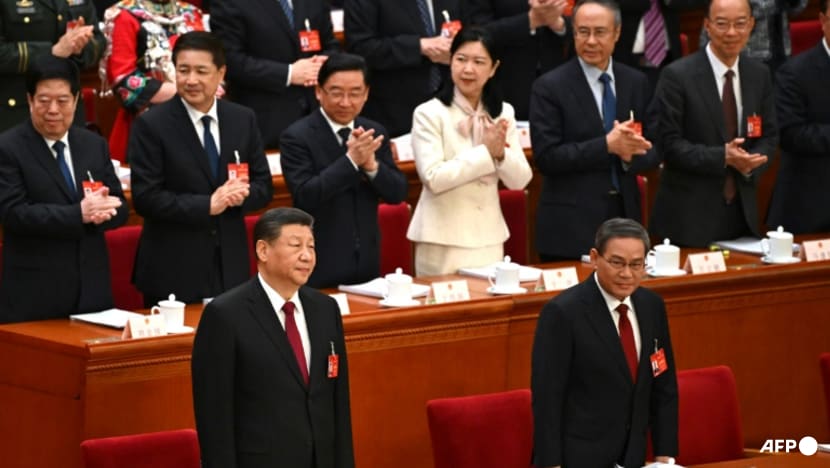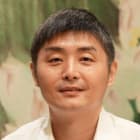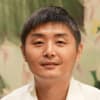Commentary: What to make of China not appointing new foreign minister at ‘two sessions’
It had been widely speculated that Liu Jianchao would replace Wang Yi as foreign minister. That the transition did not happen at the National People’s Congress could point to some considerations on President Xi Jinping’s mind, says NUS East Asia Institute’s Chen Gang.

China's President Xi Jinping (front left) and Premier Li Qiang arrive for the opening session of the National People's Congress (NPC) at the Great Hall of the People in Beijing on March 5, 2024. (Photo: AFP/Greg Baker)

This audio is generated by an AI tool.
SINGAPORE: At the sidelines of China’s biggest political gathering last week, Foreign Minister Wang Yi blasted the United States for efforts “to suppress China”, hailed close ties with Russia and warned that those seeking independence for Taiwan would be “liquidated by history”.
There had been speculation before the two sessions that China might appoint a new foreign minister. Veteran diplomat Wang had been brought back in July 2023 to replace his successor Qin Gang, who saw a meteoric rise and fall within seven months.
Mr Qin, once an acerbic spokesperson labelled “wolf warrior” by Western observers, had been trying to stabilise relations with the United States and its allies after he became the youngest foreign minister in China’s reform era. But he was surprisingly ousted, amid speculation he had an extramarital affair that potentially compromised national security.
The name bandied about to take over Mr Wang was Liu Jianchao, another star from China’s diplomatic corps, with experience as a spokesperson for the foreign ministry but without the wolf warrior tag.
NO NEW FOREIGN MINISTER
But the annual meetings concluded on Monday (Mar 11) without major personnel changes. What can we make of this?
Some have suggested this is indicative of President Xi Jinping’s focus on domestic issues – with an ailing economy facing slow consumption, a sluggish property market and high youth unemployment – rather than the international.
The top leadership would also be more cautious in picking the next foreign minister, given the lessons from Mr Qin’s fast-track promotion and the huge diplomatic stakes in a changing world order.
Liu Jianchao is still in the pipeline to replace the second-time Foreign Minister Wang Yi, but given the latter’s impeccable performance in handling Asian affairs and relations with the Global South, Mr Xi may delay the power transition to keep the momentum of his signature Belt and Road Initiative (BRI) in the developing world.
It’s also important to note that the appointment of a new minister can happen anytime, not necessarily at the Two Sessions. Former navy chief Dong Jun was named defence minister in December 2023 after Li Shangfu was also abruptly removed two months earlier.
HOW LIU JIANCHAO COMPARES TO QIN GANG
Mr Liu and Mr Qin share similarities in personality and experience, both having worked for the foreign ministry’s information department, the training ground for all spokespersons.
Foreign ministry spokespersons, compared to other diplomats, need to have better mastery of foreign language and better communication skills, especially with foreign journalists.
The two men are notably fluent in English, Mr Liu having studied at Oxford University in the 1980s and worked a four-year stint in the United Kingdom in the 1990s. They share the relaxed confidence lacking in many Chinese officials when facing public and foreign guests.
Both are engaging and witty. In 2008, after an Iraqi reporter threw his shoes in anger at then US President George W Bush, Mr Liu remarked in a media briefing: “Maybe I need to watch out, not just for who is raising their hands, but who is taking off their shoes.” Mr Qin joked about being labelled a wolf warrior when he became China’s ambassador to the US. “Now I'm back as the foreign minister, the media have stopped calling me that way. I feel kind of at a loss,” he said last year.
Although Mr Qin’s rhetoric was sometimes fierier, Mr Liu’s tough actions proved his loyalty, leading the party’s campaign in the mid-2010s – named Operation Fox Hunt – to bring back corrupt officials from abroad. Mr Liu showed off his negotiation skills by snaring high-profile fugitives and recovering large sums of absconded money abroad.
Unlike Mr Qin and many other career diplomats, Mr Liu acquired local governance experience by working as a deputy party secretary in a remote county of Liaoning province.
FROM WOLF WARRIOR TO OLD-SCHOOL DIPLOMACY?
In the current geopolitical climate, Chinese diplomats will inevitably be in the international spotlight. The East Asian superpower needs them to foster relationships with the Global South, expand overseas influence and stabilise thorny relations with the United States.
Chinese diplomats, hoping to avoid the wolf warriors label, are making effort to soften their diplomatic tones without compromising China’s foreign policy guidelines. Even if the possibility of a second Donald Trump presidency looms large, Chinese diplomats are not ready for another round of wolf warrior diplomacy to hedge against a tougher US stance on China.
Mr Liu now leads the party’s international liaison department managing ties with foreign political parties and socialist countries. Since taking the role in 2022, he has travelled to more than 20 nations and met officials from more than 160 countries.
During a high-profile trip to the United States in January, Liu met with Secretary of State Antony Blinken and promised to help build stable, healthy and sustainable China-US relations and to address the concerns of the American businesses over market access, cross-border data flow and equal participation in government procurement.
His experience of being ambassador to the Philippines and Indonesia means he comes with a better understanding of Southeast Asia, a pivotal area for the US' Indo-Pacific strategy.
Liu Jianchao’s rise through the ranks indicates that China still values diplomats with good communication skills. Wolf warriors often draw lots of media attention, but most of China’s diplomacy is still being done in a quiet and low-profile way, which is effective for the country to project its overseas influence.
Whoever China’s next foreign minister is, he or she will be expected to be the top advocate for BRI projects, a key manager of public relations with the international community and an effective mediator in international conflicts. Striking the right diplomatic tone will be needed if China wants to enhance its soft power.
Dr Chen Gang is Deputy Director and Senior Research Fellow of the East Asian Institute, National University of Singapore.


















